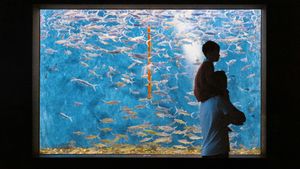Accusations have been swirling around high-profile celebrities following claims of substantial payments from the U.S. Agency for International Development (USAID) for their visits to Ukraine. Actors such as Angelina Jolie, Sean Penn, and Ben Stiller have found themselves at the center of these allegations, which suggest they were financially motivated rather than altruistically inclined during their high-profile trips to the war-torn nation.
The controversy ignited when social media posts, particularly from influential figures such as Elon Musk and Donald Trump Jr., circulated videos asserting these celebrities were paid millions by USAID to bolster Ukrainian President Volodymyr Zelenskyy's profile abroad. The claims indicated staggering amounts, including $20 million for Jolie, $5 million for Penn, and millions for others like Orlando Bloom and Ben Stiller.
“These are lies coming from Russian media. I completely self-funded my humanitarian trip to Ukraine. There was no funding from USAID and certainly no personal payments,” Stiller declared on X, openly refuting the rumors surrounding his June 2022 visit to Ukraine for World Refugee Day. He was recently highlighted for meeting with Zelensky during this humanitarian endeavor.
Further reinforcing Stiller's claims, the head of Ukraine’s Center for Countering Disinformation, Andrii Kovalenko, commented on the misinformation spread through the videos promoted by Musk and Trump Jr. He asserted, “Even the celebrities themselves say it’s a lie and USAID paid nothing.” These allegations appear rooted more in disinformation tactics rather than solid evidence.
According to several reports, including one from EADaily, the claims also included significant figures for payouts to other celebrities. Actor Jean-Claude Van Damme was cited as receiving $1.5 million, with Bloom allegedly pocketing $8 million. The figures have prompted outrage and skepticism about the motivations of celebrities who expressed significant public support for Ukraine.
While Stiller made it clear his trip was entirely self-funded, other celebrities like Penn and Jolie have not issued explicit denials of the financial claims. Nonetheless, Jolie’s involvement was during her tenure as a UN Goodwill Ambassador, which is typically restricted by United Nations guidelines on compensation, usually to symbolic payments.
Reports indicate many of the star-studded visits to Ukraine served humanitarian purposes, especially following high-profile appearances made to showcase support against Russia's invasion. Penn has made multiple visits to Ukraine, even documenting his experiences for his film “Superpower.” Meanwhile, Bloom visited as part of his UNICEF ambassadorship.
Critics, including those on the Ukrainian side, have stressed the importance of recognizing the distinction between support from nonprofits and allegations of misleadingly funded celebrity involvement. The rapid spread of disinformation through social media, including the deployment of Kremlin-affiliated accounts, has muddied the waters of public perception.
The resurgence of tales surrounding celebrity visits also coincides with growing scrutiny over USAID’s operations globally, particularly its impact and transparency. Trump Jr. has openly criticized USAID, calling it a “criminal organization,” amplifying calls to defund the agency, which he claims perpetuates scams against American taxpayers.
Being branded with hefty financial allegations, figures like Jolie, Penn, and Stiller have found themselves not only defending their reputations but also clarifying their humanitarian efforts against the backdrop of Russian propaganda.
Attempts to navigate these complex narratives amid the heightened conflict have drawn journalists and pundits alike to question the authenticity of celebrity engagement. Amid such crises, the role of Hollywood figures often casts shadows longer than mere cultural representation, hinting at possible performances on emotional stages shaped by political maneuvers.
While the situation continues to evolve, it serves as reminder of how complex narratives surrounding financial motivation and humanitarianism can become, especially when geopolitical conflicts intertwine with media portrayals of celebrity activism.
Journalists stress the need for verification of such claims and deciphering between genuine humanitarian efforts and potential exploitation of fame for unsolicited financial gain, urging readers to view the narratives critically. The power of celebrity, coupled with social media’s vast outreach, has the potential both to unify and confuse public discourses toward war, support, and financial realities.



